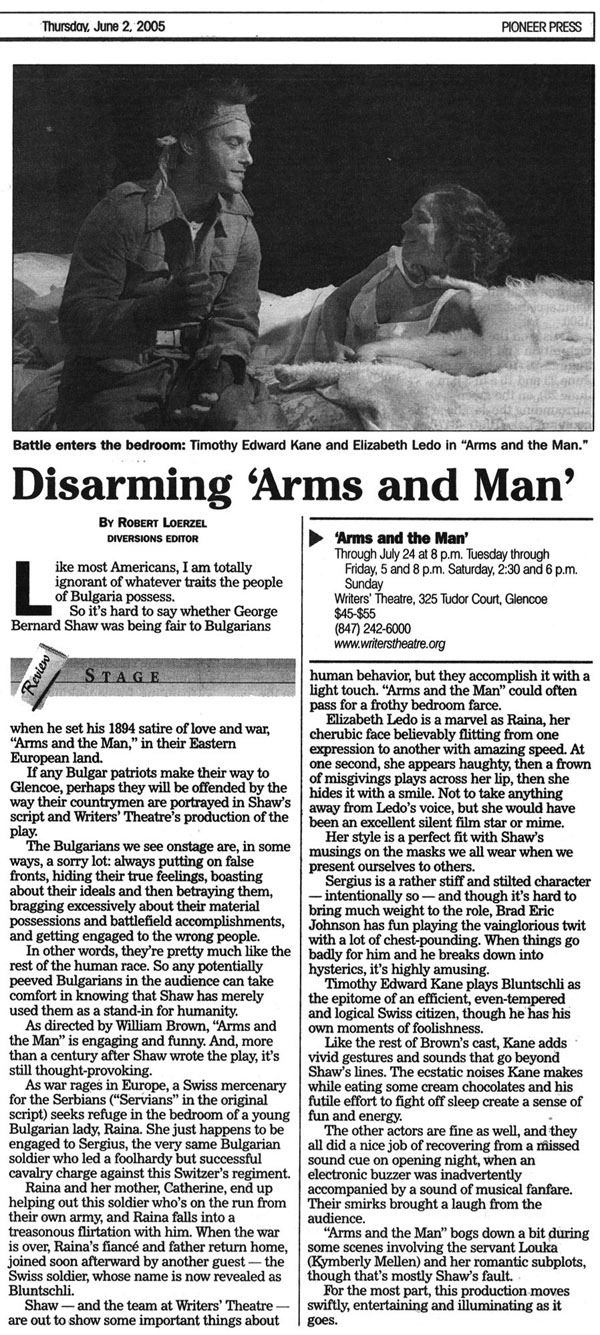This review by Robert Loerzel originally appeared in Pioneer Press on June 2, 2005.
Like most Americans, I am totally ignorant of whatever traits the people of Bulgaria possess.
So it’s hard to say whether George Bernard Shaw was being fair to Bulgarians when he set his 1894 satire of love and war, “Arms and the Man,” in their Eastern European land.
If any Bulgar patriots make their way to Glencoe, perhaps they will be offended by the way their countrymen are portrayed in Shaw’s script and Writers’ Theatre’s production of the play.
The Bulgarians we see onstage are, in some ways, a sorry lot: always putting on false fronts, biding their true feelings, boasting about their ideals and then betraying them, bragging excessively about their material possessions and battlefield accomplishments, and getting engaged to the wrong people.
In other words, they’re pretty much like the rest of the human race. So any potentially peeved Bulgarians in the audience can take comfort in knowing that Shaw has merely used them as a stand-in for humanity.
As directed by William Brown, “Arms and the Man” is engaging and funny. And, more than a century after Shaw wrote the play, it’s still thought-provoking.
As war rages in Europe, a Swiss mercenary for the Serbians (“Servians” in the original script) seeks refuge in the bedroom of a young Bulgarian lady, Raina. She just happens to be engaged to Sergius, the very same Bulgarian soldier who led a foolhardy but successful cavalry charge against this Switzer’s regiment.
Raina and her mother, Catherine, end up helping out this soldier who’s on the run from their own army, and Raina falls into a treasonous flirtation with him. When the war is over, Raina’s fiance and father return home, joined soon afterward by another guest — the Swiss soldier, whose name is now revealed as Bluntschli.
Shaw — and the team at Writers’ Theatre — are out to show some important things about human behavior, but they accomplish it with a light touch. “Arms and the Man” could often pass for a frothy bedroom farce.
Elizabeth Ledo is a marvel as Raina, her cherubic face believably flitting from one expression to another with amazing speed At one second, she appears haughty, then a frown of misgivings plays across her lip, then she hides it with a smile. Not to take anything away from Ledo’s voice, but she would have been an excellent silent film star or mime.
Her style is a perfect fit with Shaw’s musings on the masks we all wear when we present ourselves to others.
Sergius is a rather stiff and stilted character — intentionally so — and though it’s hard to bring much weight to the role, Brad Eric Johnson has fun playing the vainglorious twit with a lot of chest-pounding. When things go badly for him and he breaks down into hysterics, it’s highly amusing.
Timothy Edward Kane plays Bluntschli as the epitome of an efficient, even-tempered and logical Swiss citizen, though he has his own moments of foolishness.
Like the rest of Brown’s cast, Kane adds vivid gestures and sounds that go beyond Shaw’s lines. The ecstatic noises Kane makes while eating some cream chocolates and his futile effort to fight off sleep create a sense of fun and energy.
The other actors are fine as well, and they all did a nice job of recovering from a missed sound cue on opening night, when an electronic buzzer was inadvertently accompanied by a sound of musical fanfare. Their smirks brought a laugh from the audience.
“Arms and the Man” bogs down a bit during some scenes involving the servant Louka (Kimberly Mellen) and her romantic subplots, though that’s mostly Shaw’s fault.
For the most part, this production moves swiftly, entertaining and illuminating as it goes.
